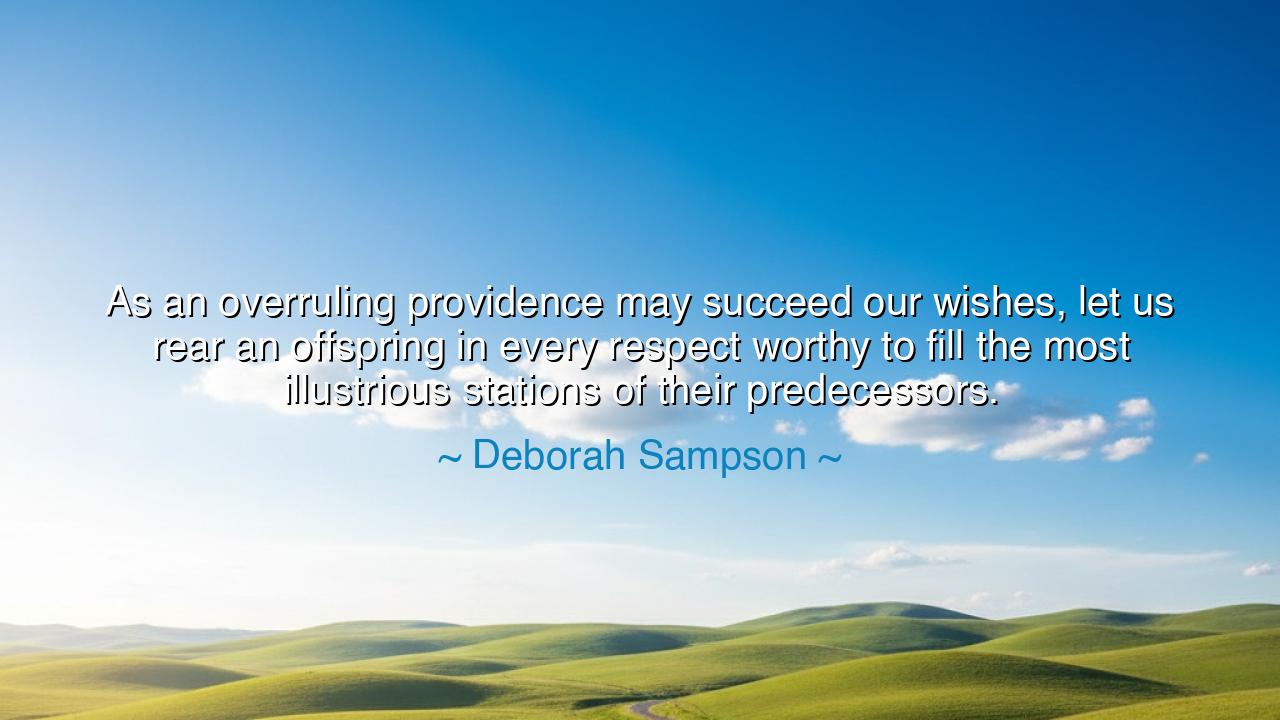
As an overruling providence may succeed our wishes, let us rear
As an overruling providence may succeed our wishes, let us rear an offspring in every respect worthy to fill the most illustrious stations of their predecessors.






Hear, O children of liberty, the voice of Deborah Sampson, a woman who clothed herself in the armor of men and took her place upon the field of battle in the American Revolution. She declared: “As an overruling providence may succeed our wishes, let us rear an offspring in every respect worthy to fill the most illustrious stations of their predecessors.” These words, like fire cast upon the hearts of generations, are not merely the reflection of one soldier, but a call to every mother, father, and teacher—that the seed we plant today shall determine the honor of tomorrow.
Consider the depth of her wisdom. She invokes providence, that unseen hand of destiny which governs the rise and fall of peoples. Sampson, who had lived in disguise to fight alongside men, knew that her life was part of a story larger than herself. She recognized that human strength and will, though mighty, are yet dependent upon divine mercy and fate. Thus she urged that since destiny may yet crown our efforts, we must labor diligently to form our children into beings capable of carrying forth the burdens and glories left by those who came before.
The offspring she speaks of are not merely children of the flesh, but heirs of the spirit—those who must bear the mantle of freedom, of justice, of virtue. To be “worthy” of their predecessors is to measure up to the sacrifices of patriots, to the courage of warriors, and to the wisdom of statesmen. For what use is victory in battle, if the children born of that victory grow soft, selfish, or ungrateful? Sampson knew well that revolutions are not secured in the battlefield alone; they are secured in the hearth, in the schoolhouse, in the shaping of souls.
History gives us shining examples of this truth. After the fall of Athens to Sparta, the Athenians turned their energies to philosophy, to the rearing of minds, and gave the world Plato and Aristotle. Though their city had lost its power, their offspring rose to fill stations even more illustrious than their forebears—guardians not of armies, but of thought. Likewise, in the early years of the fledgling United States, men and women who had endured war labored to educate their children, that they might become leaders in politics, science, and literature. The flame of liberty, once lit, had to be passed hand to hand, heart to heart, generation to generation.
There is a stern warning hidden in her words as well. Should the children fail to be reared with virtue, the sacrifices of the ancestors will be in vain. Rome herself, mighty and eternal in appearance, crumbled not because her legions failed, but because her sons abandoned the virtues of their predecessors. Luxury, corruption, and indifference destroyed what no foreign foe could conquer. Sampson’s cry is therefore a shield against this decay: to nurture in the young the discipline, gratitude, and courage that preserve the victories of the past.
So what lesson must we draw from this voice of old? It is this: your duty does not end with your own success. It extends to those who come after you. To rear your children, your students, your apprentices, not only in skill but in character, is the highest service you can render to your nation and to your God. Let the legacy of your predecessors be not a burden of memory, but a standard to be surpassed.
Practical action lies before you, simple yet profound. Teach the young the stories of sacrifice. Instill gratitude for the gifts they inherit. Train their hands in discipline, their hearts in compassion, their minds in truth. Praise not only achievement, but integrity. Demand from them not ease, but purpose. And in doing so, you ensure that the victories of today do not fade with your passing, but rise anew in stronger, nobler forms.
Thus, remember the words of Deborah Sampson: trust in providence, but labor with your own hands. Rear an offspring worthy of liberty, of sacrifice, of greatness. For only then will the most illustrious stations of the past be not monuments of what was, but foundations of what shall yet be.






AAdministratorAdministrator
Welcome, honored guests. Please leave a comment, we will respond soon